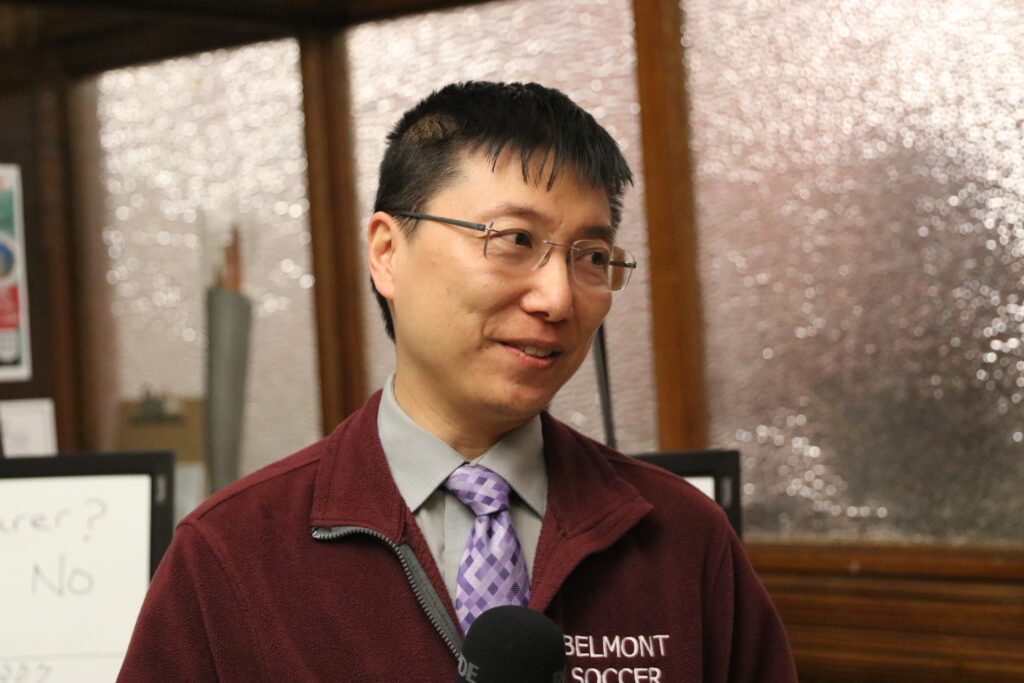Photo: (from left) Select Board Chair Mark Paolillo, Rink Building Committee Chair Mark Haley, and Building Committee members Dante Muzzioli and Anne Marie Mahoney speaking on the passage of the debt exclusion for a new municipal rink and recreation center for Belmont.
This past Nov. 8, it appeared the proposal to replace the existing ‘Skip’ Viglirolo Skating Rink was all but dead and buried when a $33 million debt exclusion to build a new rink facility failed in the general election by approximately 350 votes out of 11,800 cast.
But a lifeline tossed by the Select Board that night to give the measure many believed would pass if provided a rare second bite at the apple proved prophetic as the new rink/recreation center project was given an enthusiastic thumbs up as the modified $29.9 million project was approved by nearly 1,500 votes, 3,904 to 2,421.
Get unofficial results from the April 4 election at the Town Clerk’s web page here
“Feels great,” said Mark Haley, chair of the Municipal Skating Rink Building Committee, as he and committee member Dante Muzzioli, nervously watched as the votes trickled in while they camped out in the lobby of the Select Board Room on the second floor of Town Hall. “Once given a chance to tell our story, I knew residents would be back it.”
“The town … understands how important this rink and recreation facility was for this town, and they supported it,” said Muzzioli. “It’s a beautiful day for Belmont.”
Muzzioli praised the three leaders of the “Yes For Rink” campaign – Sheryl Grace, Lucinda Zuniga, and Kayla Wiggin – as “the reason the question passed. They worked and worked and got it done.”
“Shows that hard work pays off, for sure. We had to come back for our kids,” said Zuniga, who arrived with Wiggin and Grace at Town Hall to celebrate the news. The “Yes” campaign raised $1.3 million while conducting an effective campaign based on getting the facts about the rink to the public.

And many on the building committee noted that Select Board Chair Mark Paolillo was one of the “heroes” of the campaign as he led the board in reviving the project after its initial defeat.
“A three hundred vote margin is not a mandate, especially with the library being on the same ballot,” said Paolillo. “It was only fair to allow it to go before the voters again.”
Rink Reasons
The rink supporters pointed to several changes that helped convince voters to support the project after its defeat. First, unlike in November, the rink was not coupled on the ballot with another large capital project, a new $34.5 million public library. There was some evidence that voters in November felt they were limited to selecting between the library and the rink.

Second, the building committee and the project architect, Ted Galante of The Galante Architecture Studio, abandoned an array of costly features, such as the second-floor mezzanine, and went with an all-new design which reduced the price tag by 10 percent, showing a willingness to make alterations to reduce the amount taken up by ratepayers.
Third, the rink was turned into a four-season operation in which up to five months would be dedicated to town recreation and other activities.
Fourth, rink campaigners used the time to explain in greater detail the failings of the existing building and the expanded uses a new rink will have. The initial campaign was hampered by too many balls in the air: a need to design and price the project and galvanize supporters that were squeezed into a four-month schedule during which the final cost fluctuated, and there was no firm commitment to making the facility recreation friendly.
And it didn’t hurt that the current rink’s defects caused numerous problems this season, including a nearly month-long delay in opening the rink due to warm weather and that 5,000 fewer voters came to the polls.
Haley said important work and decisions still need to be completed, including how the rink will be managed and receiving approval from Town Meeting this May for the funding for the facility.
Demolition of the existing rink will begin in July with a 16-18 month construction schedule.
“Be back here in November 2024!” said Haley.
Treasurer’s Question
Town officials, the leading committees, and the Select Board all backed a Collins Center recommendation changing the Town Treasurer from an elected to an appointed position toward centralizing the town’s financial operations.
While many residents expressed concern that an appointed treasurer would be beholden to the Town Administrator rather than the public, others pointed out that many essential town functions are led by appointed employees and officials and that many similar communities to Belmont have or are moving to the appointed treasurer post.
And with no candidate running to claim the seat, establishing an appointed treasurer position was not seriously challenged. It was accepted by a more than two-to-one margin: 4,255 to 1,811.
School Committee
In a rather tepid race – the three candidates were in-line with nearly all initiatives before the school committee – life-long Belmont resident Amy Zuccarello topped the field with 4,055 votes She’ll be joined on the committee by Jung Yueh (3,306). Rounding out the contest was Rachel Watson, who garnered 2,140 votes.
“We must hit the ground running on many items, including the current and next year’s budget. But I am excited to get started,” said Yueh, who attended the vote counting at Town Hall.

Town Meeting
Some would think that being an 18-year-old, first-time candidate would be detrimental to winning a seat on Town Meeting. But if you get profiled in a daily newspaper, produce a slick website, have yourself photographed with the governor, and knock on a hell-of-a-lot-of doors (while having the best name this election cycle), you too could be like Angus James Benedict Abercrombie, who hit it out of the park Tuesday nearly receiving the most votes throughout the eight precincts with 544. Only Susanne Croy in Precinct 6 bested Abercrombie with 546. Abercrombie’s final vote tally reminds election observers of perennial Boston City Councilor Albert “Dapper” O’Neil, who said, “You don’t count my votes; you weigh them.”
In Precinct 1, a pair of newbies took the top spots. Adam Dash, who stepped down from the Select Board this year, is better known than Makinde Abeagbo, but the first-time candidate finished with 446 votes to Dash’s 443.
Incumbents who were not successful in their races include Joseph Wholley and Christopher Grande in Precinct 1, John Alcock and Ian Watson in 3, Linda Oates and Cabell Eames in 6, 25-year Town Meeting member Brett Sorenson and Natalie Kostich in 7, and Connor Maguire and the Ivesters – Heather and Karl – from 8.
Returning to Town Meeting after a forced one-year absence include Marie Warner in Precinct 6, who took a two-year seat by two votes, and Robert Sarno in Precinct 3.
Not placing your profile in the Belmont League of Women Voters Election Guide isn’t a big deal? In competitive precincts, those who left out their profile did not place in the top 12, including well-known incumbents.